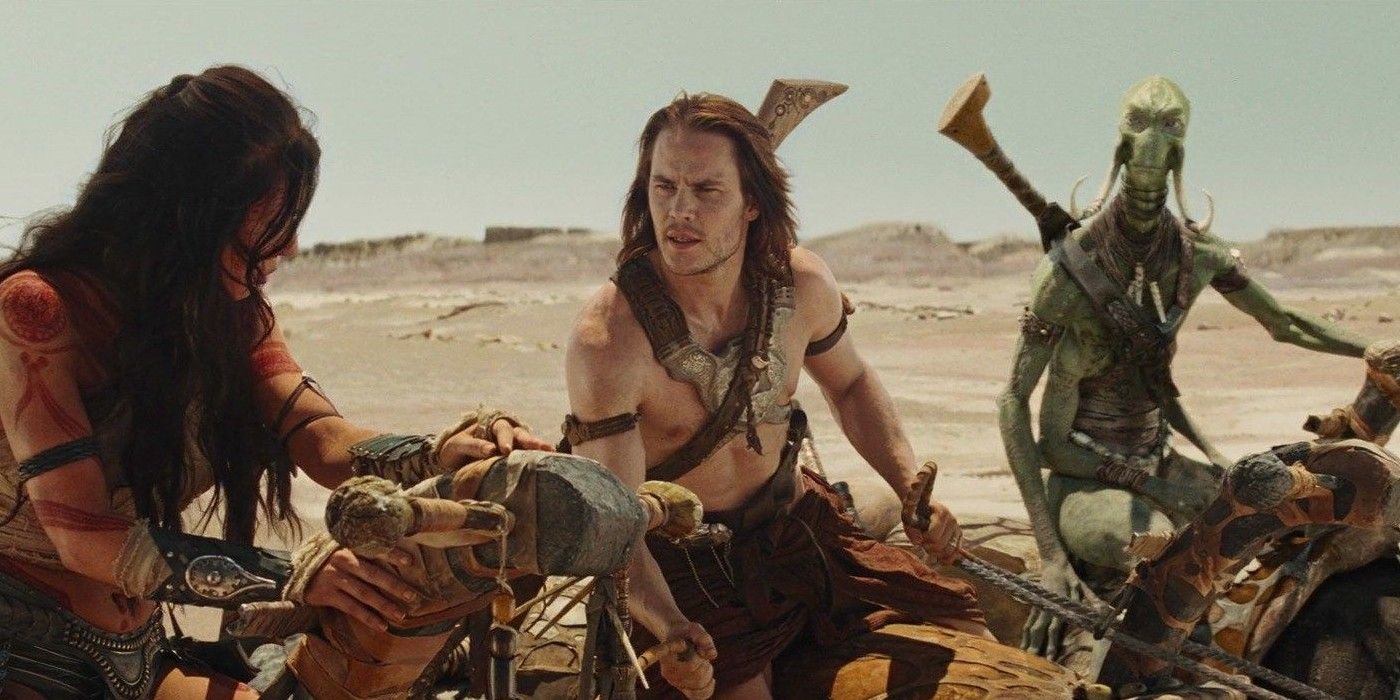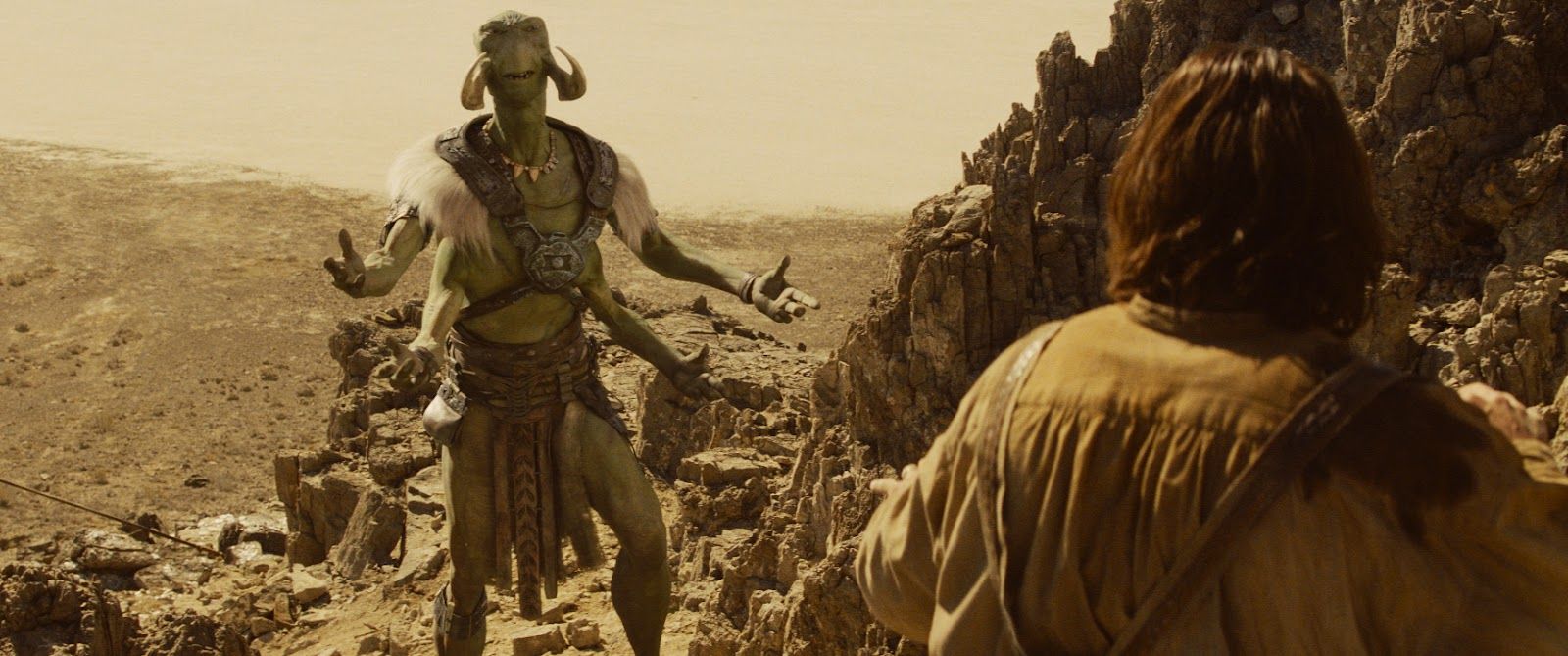John Carter's disappointing commercial and critical reception is more famous than the movie itself. Director Andrew Stanton's would-be franchise-starter had so much promise that the mere idea of underperforming seemed out of the question. But on March 9, 2012, the movie that Stanton had waited decades to make opened to lackluster numbers and negative critical reviews. The film pulled in $284 million globally, which would have made it a success had the studio not weighed it against a rumored $300 million production budget. The dream died, as did any chance of kick-starting a bold new sci-fi franchise. For years, those who saw the film and loved it wondered why it flopped so spectacularly. Those who didn't care simply dismissed it as another failed Hollywood cash grab.
For those who haven't seen the original or need a refresher, the gist of the first movie is this: The plot takes place between 1868 and 1881, when Confederate Army captain John Carter (portrayed by Taylor Kitsch) accidentally transports himself to Mars with an alien medallion he finds while fleeing Union soldiers. Upon arriving on Mars (referred to as Barsoom by its inhabitants), Carter discovers that his bone density, coupled with the planet's low gravity, grant him enhanced physical capabilities. The profoundly lost human soldier soon finds himself face-to-face with the Green Martians, called Tharks, led by Tars Tarkas (Willem Dafoe). Unbeknownst to Carter, civil unrest between the various Martian races is escalating, with Red Martian princess Dejah Thoris (Lynn Collins) caught in the middle with him. The shape shifting Therns, led by Matai Shang (Mark Strong), complicate things further, leading to a deadly conflict on many fronts. The first film ends with Carter returning to Mars after faking his death, tricking Shang, and winning an old challenge that kept him trapped on Earth.
During the months leading up to John Carter's 2012 release, Stanton mentioned on several occasions that he had plans for sequels in the event that the first film was a success. However, he didn't disclose what those plans were or what the sequels would look like. Until now.
During a recent interview with The Wrap, Stanton revealed plot details for that canceled sequel, titled Gods of Mars, for the first time:
I love the idea of you were going to open with the prologue. It was going to be that every movie had a different character saying the prologue. The first one is Willem, as Tars. The second one’s prologue narration was going to be Dejah. And it was going to give anybody that hadn’t seen the first movie a little precursor of the history that got you to this movie. Shorthand, interesting imagery, whether it was artwork or whatever. And then you were going to reveal she was telling it to her baby. And you were going to realize, Oh my God, it’s the child. It’s Carthoris, this child of Dejah Thoris and Carter. And that story she’s telling, she’s telling the story of the father that this child will never know.
And then her dad, Ciarán Hinds’ character, Tardos Mors, said she’s been up too long, she’s tired, let her grandfather have a moment with the child and I’ll put her to bed. Then it was going to be revealed to be Matai Shang in shapeshifting mode. And he was going to steal the baby. And then it was going to go onto the opening credits. The next image after the opening credits was going to be Carter lying in his funeral suit in the middle of the desert, just looking like a dead body in a wake and just waking up.
Originally intended to kick off a film trilogy adapting Edgar Rice Burroughs' Barsoom books, the one-and-done John Carter failed due to several problems that were nearly impossible to predict when the production was greenlit. One of the biggest hurdles that the project never cleared was its ill-fated marketing campaign. During production, Disney's new movie marketing head MT Carney decided to drop "of Mars" from the title. Stanton didn't approve, but he didn't fight the call, either. "It wasn’t my call," Stanton told TheWrap. "It was suggested and I didn’t fight it." They didn't know it then, but the likelihood of a sequel was moving further and further out of reach. The marketing was too muddled, too confusing.
Teasers, posters, and other promotional materials began popping up online in July 2011, but none of them mentioned Stanton, Burroughs, or any of the other esteemed creators responsible for the project. Stanton had directed Pixar's Finding Nemo eight years prior and Burroughs created the character Tarzan, but Disney didn't include any of those tidbits in its marketing for the movie. It was Stanton's first attempt at a live-action blockbuster, but his considerable success as a director convinced Disney execs to give him a shot. Sadly, their confidence in him was not reflected in the marketing. Ultimately, because marketing for John Carter was so ineffective, a sequel was next to impossible.
Still, Stanton's vision for what could have been is fascinating. He said:
Then he’s just going to take off his jacket like it was nothing and just start walking. And then eventually, just like out of ‘Lawrence of Arabia,’ way out in the horizon, is going to come a Thark on a thoat. And he’s going to surprise Carter by saying he knows exactly who he is and there’s been somebody looking for you. He brings him to a camp and it’s Kantos Kan which is James Purefoy, who’d been searching forever off of any river where this guy went. And so shocked that he’s found him. And then he says, ‘You have to get back now to heal him.’ And he gets back and you think it’s going to be a reunion, only to find out that there’s been some time between the prologue and the main credits.
Now Dejah’s gone missing. She’s convinced that the Therns took their child and if Carter ever comes back, she went down the River Iss to try and find him. And then, like ‘Beneath the Planet of the Apes,’ it all takes place, everybody going into the earth to find out who’s really been controlling the whole planet. There’s a whole race down there that has been with high tech. Basically, it’s been a third world without anybody knowing it on the top of the surface and the first world’s been inside the whole time operating the air, the water, the everything to keep the world functioning.
Stanton was clearly the right man for the job, but a perplexing marketing strategy, coupled with the challenges of an animation director's first foray into live-action, killed the project he had fought so hard to make.
We won't ever see Gods of Mars on the big screen (at least not from Stanton or Disney), so this new information is the closest we'll get to experiencing what could have been.


